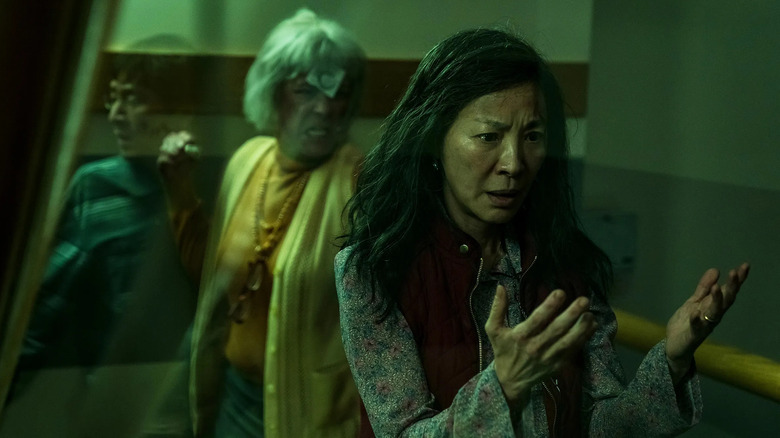
"Everything Everywhere All At Once" is, appropriately, about ... well, a little bit of everything, as far as the human experience is concerned.
Daniels' "Everything Everywhere All At Once" is a momentous achievement for a thousand tiny reasons and a few glaringly huge ones, not least of which include its depiction of intergenerational trauma, mental illness, identity, fulfillment, and specifically the experience of ADHD.
I have ADHD, but I wasn't diagnosed until 2021 at 33 years old.
The pandemic seemed to force a lot of people to really reckon with their demons and their issues, myself included. Stuck inside, forced to isolate and remain self-contained, in a way, made me jump out of my skin and my skull. I no longer had the external stimuli of the outside world to help curb my undiagnosed disability and let me manage my day-to-day life. Keyword there being "manage" rather than "live" my day-to-day life because, despite doing a lot of living, most of that was spent managing my own existence just to get by. Tempering my own expectations of life, normalcy, contentment, and calm.
None of this probably makes much sense, but my goal is to make it make sense. Hopefully. But you see, it's incredibly difficult to explain what it's like to exist with ADHD. There are stereotypes and preconceived notions of what ADHD means or looks like, and most of it is superficial at best and painfully ignorant and harmful at worst. It actively impacts whether or not people feel safe to ask for help, to seek a diagnosis or even treatment, or if someone is even able to identify that something's wrong at all.
Luckily, "Everything Everywhere All At Once" is here to help.
This Is Your Brain On ADHD
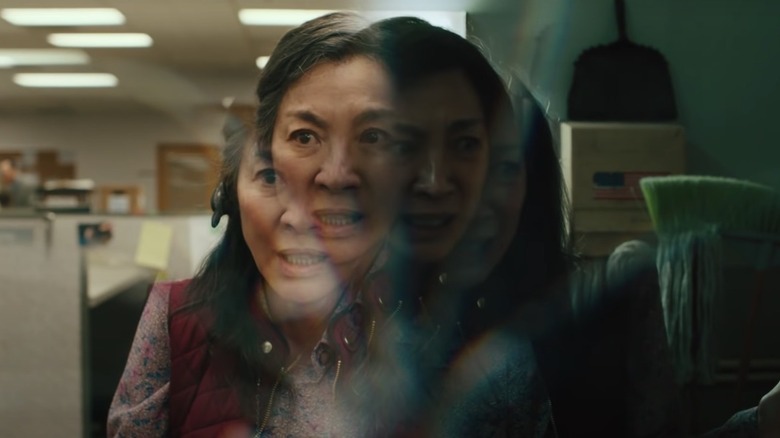
"We're all a little ADHD" and "yeah, but that's normal" are two sentiments that can rot into oblivion. Jobu Tupaki (Stephanie Hsu) isn't normal. ADHD isn't normal. It's not bad, but it's certainly not the same as baseline neurotypical existence. With "Everything Everywhere All At Once," Daniels made a movie that is actually about the sensation of being and experiencing everything, everywhere, all at once. And it all started with a little research into ADHD.
At the risk of being offensive, Daniels decided to dig into what ADHD actually was. Their desire to explore the chaotic feeling of overwhelm we'd presumably all been experiencing for years, maybe even decades, resulted in Daniel Kwan first self-diagnosing and then being formally assessed and diagnosed with ADHD. "So this movie is the reason why I got diagnosed," he said in an interview with Salon. "I got diagnosed, I went to therapy for a year and then went to a psychiatrist. And I'm now on meds, and it's such a beautiful, cathartic experience to realize why your life has been so hard." And it is.
The process of getting diagnosed is one of the most overwhelming experiences of dread and self-doubt I've ever had.
When I started seeing my psychiatrist, we needed to first manage my Generalized Anxiety Disorder (which I was also diagnosed with at 33 years old). Introducing stimulants into an anxiety-riddled mind and body is ... well, it's not great, Bob! But it wasn't until I finally started taking Adderall that I realized, like Kwan said, why my life had been so hard. And it was a beautiful, cathartic experience that was also accompanied by devastating grief and loss.
That's one of the things no one really knows about — the immense sense of loss that comes with an ADHD diagnosis as an adult.
Grief And Loss
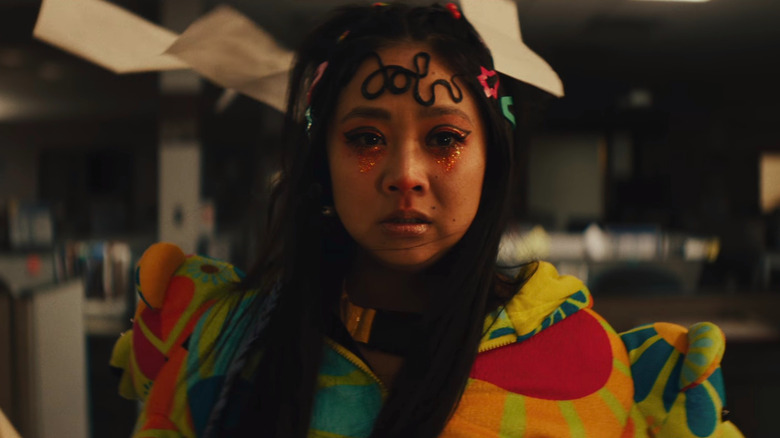
"'Right' is a tiny box invented by people who are afraid. And I know what it feels like to be trapped inside that box."
The day I got my official diagnosis, I cried and laughed simultaneously for almost an hour. I couldn't stop myself, and I didn't want to. Suddenly, everything made sense. I was elated, vindicated even. Suddenly, my very existence felt justified and made sense.
And then the grief hit. The grief that turned into despair for Joy (Stephanie Tsu), an all-consuming depression. While I laughed and cried with relief thinking "everything makes so much more sense now," I was simultaneously overwhelmed and almost wiped out by the immense sense of loss that came with knowing that.
I've been moving through life on impossible mode while being told I was stupid, irresponsible, lazy, insensitive, overemotional, overly sensitive, and a liability (all things I've actually been told, by the way). I mourned for the life I never had. The opportunities I missed, the relationships I ruined, the peace of mind I never got.
No one warned me this would happen, and I wasn't prepared for how hard it would hit me. All I could do was think of my younger self struggling every single day, with only "have you tried calming down/not being that way/being normal?" to comfort me. I thought about that little girl, that teenager, that young woman, and I wept for her. I still weep for her.
Noise And Pain
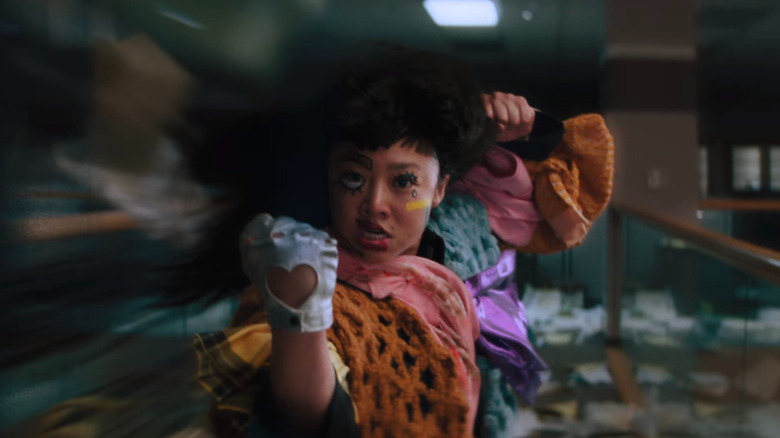
"Not a single moment will go by without every other universe screaming for your attention. Never fully there, just a lifetime of fractured moments, contradictions and confusion. With only a few specs of time where anything actually makes any sense."
An exercise my therapist has me do from time to time is talking to, as she calls it, my little one. It's essentially inner child work, where you speak as if you're standing in front of and addressing your younger self.
My little one thought she was normal, maybe a little weird, but people just didn't understand her. But she thought everyone felt this way all the time, that everyone's mind constantly hummed like a tuning fork that never stops ringing. I always described it as this immense surge of energy that I could hear and feel in my skull but that I could also feel in my spine. It's like boiling water molecules moving at an incredibly fast rate.
At any given second, there are at least a dozen consecutive thoughts screaming in my head as loudly as possible, all vying for the same level of attention that none of them ever get. Living like that for 33 years, with a constant din of self-doubt and preoccupation, can be excruciating. There are times when it feels like your mind and your body are trying to run in completely separate directions at 100 miles per hour starting at zero, and it causes physical pain. I can feel it right now while I'm writing this, probably because I'm actively thinking about it. It feels like my lower back is on fire, and no amount of cold will soothe it. It's a kind of overstimulation many will never know, and for that, they're eternally fortunate.
Isolation And Despair
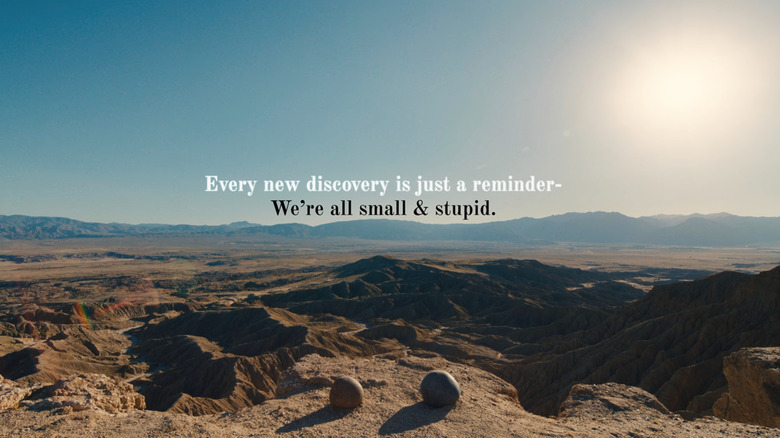
"All this time, I wasn't looking for you so I could kill you. I was just looking for someone who could see what I see. Feel what I feel."
Growing up undiagnosed is like living on another planet, so you learn how to imitate its inhabitants in order to survive. You don't know why you're there, or why you seem to be the only person who's different, but you are. You assume it's your own fault, that you're just stupid or inept.
ADHD is genetic, or at least they think it is. There's still so much we don't know about it. But getting diagnosed unraveled a Benoit Blanc-style mystery that had been plaguing me for over 30 years: why was I like this, and where did it come from? I still don't technically know for sure, but all signs point to it coming from my dad.
Who else is supposed to understand you better than your parents? Joy is desperately searching for answers to why she is the way she is, and the fact remains that Evelyn made her this way, either genetically speaking as her mother or in terms of the film's allegory of Evelyn creating Jobu Tupaki from the same circumstances that made her. I just wanted to know that there was a reason why I felt so alone and so different. I had to find someone else like me.
Realizing it was my dad made sense of everything, but he wouldn't get assessed. "No, I'm not like you," Evelyn tells Jobu while staring at the Everything Bagel. "You're young, and your mind is always changing. I still know who I am." If it ain't broke, don't fix it, right? I found my Evelyn, but he wasn't ready to look into the bagel, as it were, and I don't blame him.
Identity
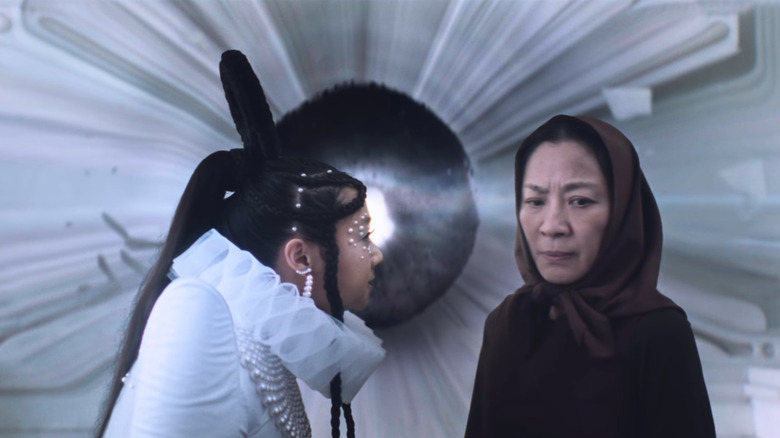
"You have no idea what you've done. You're stuck like this forever."
You can't unring the bell, and you can't unlearn the truth. Once you get a diagnosis, everything changes. It's simultaneously empowering and devastating, blending the elation of an epiphany with the tragic sense of defeat that accompanies the realization of loss.
Whether you like it or not, you start to unmask. Certain tasks become more difficult, functioning like you used to is no longer an option, and now everything feels ... different. Suddenly, you're a completely different person, almost against your own will. And you can't escape this stranger because they're you. The only option is to get to know them, to get to know yourself, from scratch.
After getting diagnosed and after starting Adderall for the first time, I had to re-learn how to process emotions. Everything felt strange and foreign. Sadness was more palpable and devastating than ever before. Joy was so overwhelming it would send me into a panic attack. I was so confused all the time and had to learn to be gentle with myself as a result. I'm still terrible at that part, but this is an unending process.
I remember asking my psychiatrist if it was normal to feel this way as if the things I could cope with before were suddenly harder than they'd ever been. He said it was. It was all a part of the process of getting diagnosed. There's a release that happens naturally, almost like your mind can let go of the pretense it had been maintaining your entire life. A reflex where your brain just stops fighting itself and exhales. And there's no going back.
Love And Connection
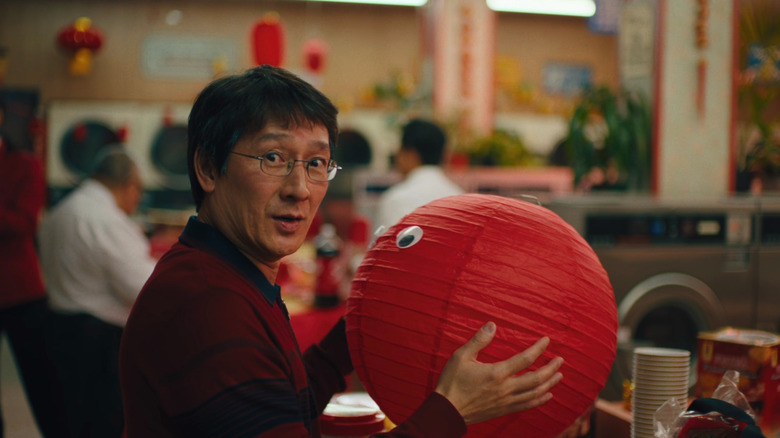
"The only thing I do know is that we have to be kind. Please be kind, especially when we don't know what's going on."
Existing this way your entire life can make you so angry. It hurts more deeply than I know how to put into words. You'll push away the people that you love and who love you because you're so full of self-loathing that it bleeds out onto everyone around you, the people who make you feel safest. Before my diagnosis, while I was starting treatment for my Generalized Anxiety Disorder, I pushed everyone away from me. I hurt my closest friends, I lashed out at my husband and my mom. It wasn't until they told me how I was affecting them that it really hit me — it was ok to be hurt and angry and confused, but it didn't give me the right to direct that pain at the people who love me when all they were trying to do was help.
Waymond doesn't completely know or understand why Evelyn and Joy act the way they do, but he wants to. Even when Evelyn is so scared, angry, and confused that she literally stabs him, he leads with love. We need each other in order to survive. I wouldn't be here without the love of the people around me, even when I probably didn't deserve it. And I'm lucky that way, I know I am. That's a privilege I will never overlook.
It's not easy to exist like Waymond does, so full of hope and love. But it's the most valuable skill you'll ever learn.
A Sense Of Belonging
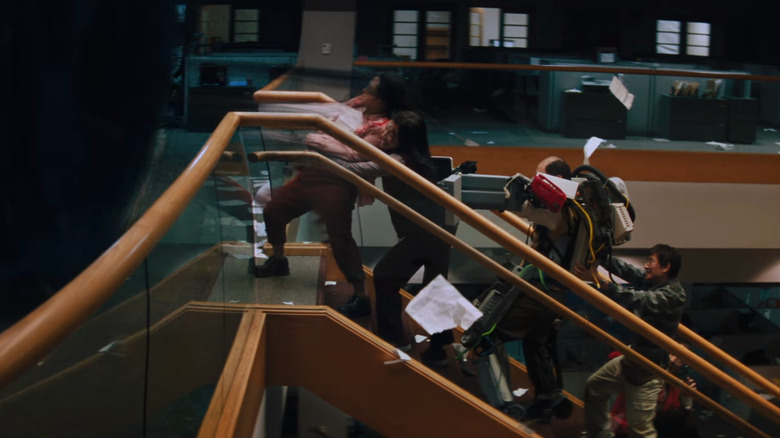
"No need to explain."
When you find your community that you didn't know existed, suddenly you're not alone anymore. There are others like you. After spending more than 30 years feeling like I was alone on a planet full of strangers, unable to communicate, suddenly it clicked. I felt safe. I wasn't alone anymore and never had to be again.
One thing my psychiatrist encouraged me to do was to keep a journal of how I felt while adjusting to medication and going through therapy. I knew I wouldn't be able to keep up with it if I was writing it down, not with how debilitating my anxiety was at the time, so I recorded videos instead. And I shared them online — TikTok, Twitter, Instagram. I went through everything very publicly because it was a way for me to reclaim my sense of self. And in that process, I found others like me.
Sometimes, they were complete strangers offering invaluable advice to help me cope with the shock of my diagnosis. In other cases, they were people I'd known for years but never really connected with in a meaningful way. Suddenly, I was meeting and speaking with people like me, especially other women, and I felt more like myself than I had in my entire life. I started to be able to tell when someone also had ADHD. Fragments of dialogue peppered in between painfully large smiles and huge feelings of relief and comfort as we shared all the little things we'd learned about being a woman with ADHD who was diagnosed late in life. (Fun fact, your period severely impacts your cognitive function, often making ADHD symptoms substantially worse.) It feels like finding a new branch of your family you didn't know about. You feel understood. You feel, dare I say, normal. Maybe for the first time in your life.
Insecurity
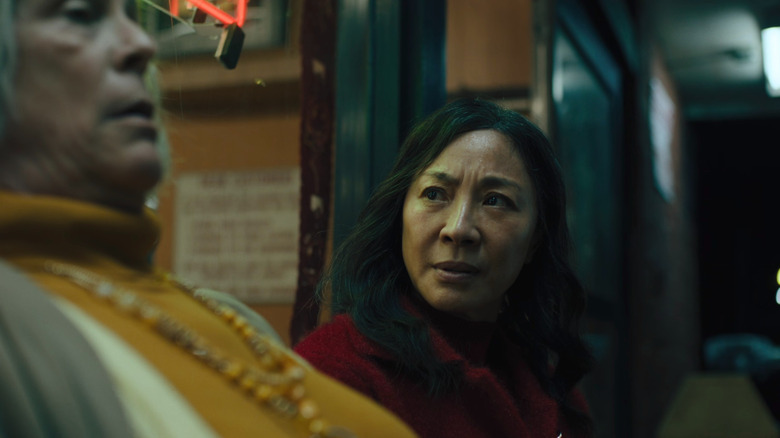
"It's cold, unloveable b****** like us that make the world go 'round."
From the perspective of ADHD, it's so easy — in fact, it's kind of the baseline — to get numb to existing. I spent most of my life feeling unloveable. Unworthy. I was too much in every conceivable way. I felt too much, I said too much, I did too much and I did it too big. I always thought there was something wrong with me because the world and everyone around me (however indirectly or accidentally) told me there was. I always needed to change. Be smaller, quieter, duller, simpler, more cooperative, more normal, less affected by everything.
But the truth is, there was never anything wrong with me. There still isn't.
"That's not true," Evelyn says in response to Deirdre's self-deprecation. "You're not unloveable. [...] There is always something to love. Even in a stupid, stupid universe where we have hot dogs for fingers, we get very good with our feet!"
Sometimes it feels like I have hot dogs for fingers in a world of people with normal hands, all of whom keep asking me why I can't just use my hot dog fingers like normal fingers. Forcing yourself into that box, to conform to that kind of thinking, making yourself believe those requests to be true and harmless ultimately lets you kill a little part of yourself every time. Like the version of Evelyn who spent her entire life thinking she's capable of nothing, you start to believe you're useless. Eventually, you tell yourself that so often that it becomes your reality. The insecurity of not being good enough or of being too much in any capacity becomes your identity, whether you chose it willingly or not.
Generational Trauma
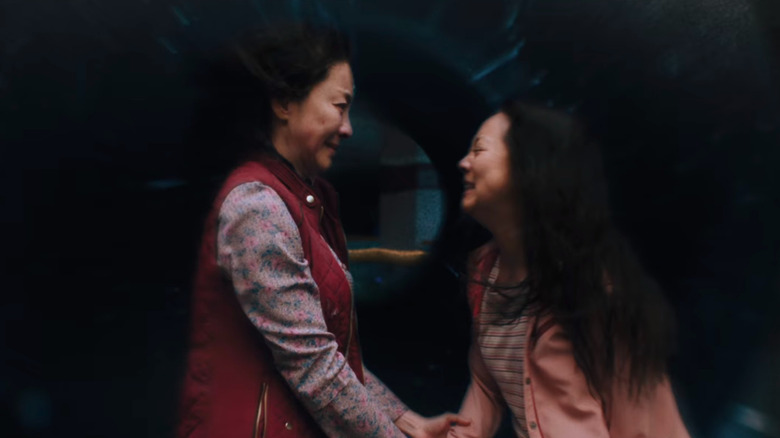
"Please. I cannot lose another loved one to the darkness."
The notion that people with cognitive disabilities are broken or bad or unworthy of kindness, decency, and respect is wrong and, frankly, stupid. And still, it persists. This notion that it's something we need to be saved from rather than simply another part of us.
Our parents want nothing more than for us to lead happy and fruitful lives, but that notion often takes precedence over its practice. Gong Gong (James Hong) sees Evelyn as a failure, having succumbed to her own uselessness, to herself. "Please. I cannot lose another loved one to the darkness," Gong Gong pleads to Evelyn as she desperately tries to save her daughter from giving into despair.
Generational trauma looks different for everyone and each family deals with it in their own way. I'm a first-generation Canadian on my mother's side. She moved to Canada from Buenos Aires when she was 14 years old. Her parents wanted her and my aunts to have a better life than they did, but those expectations became a prison of their own, and mental health was never really up for discussion.
On my father's side, you don't talk about mental illness. You just don't. So much familial trauma has been swept under the rug on that side of the family for several generations, and that'll probably continue to be the case for a very long time. I said no more.
"I am no longer willing to do to my daughter what you did to me," Evelyn defiantly tells Gong Gong. "How did you let me go? How on earth did you do it so easily? It's okay if you can't be proud of me because I finally am."
Disabilities As Superpowers
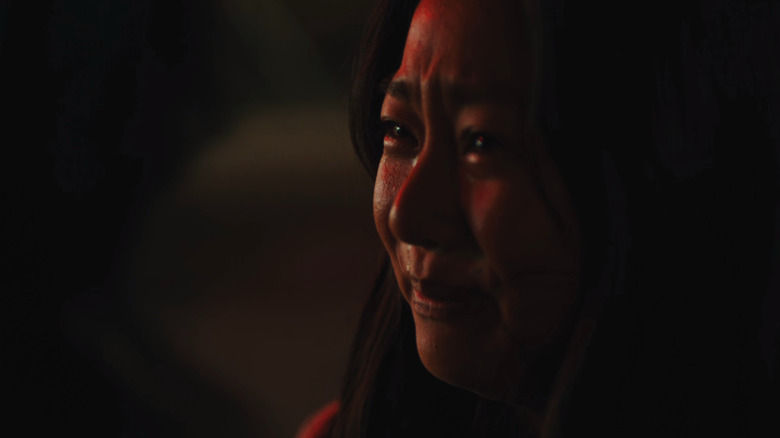
"This is how I fight."
This should be the part where everything comes together in some big revelation about how I figured it all out, and how "Everything Everywhere All At Once" helped me get there. But that's not how it works. And that's not how this goes.
Watching "Everything Everywhere All At Once" felt like my entire process of getting assessed, diagnosed, and starting treatment in a tidy little 139-minute-long package. It's very easy for invisible disorders and disabilities to get left behind. It was like they'd cracked open my soul and my mind and painted a perfect likeness of it for all the world to see. It was a kind of representation I never realized I was lacking, and that's coming from a pansexual Jewish woman. It is the most potent cinematic experience I've ever had. And at the end of it all, it reminded me that my brain, my mind is beautiful just the way it is.
Daniels managed to create the perfect depiction of the ADHD experience. At least for me. We're not a monolith, after all.
I am capable of incredible things when I'm allowed to function within the parameters of my cognitive abilities. I've learned countless skills, from how to completely resurface a bathtub, the intricacies of gardening, and resurfacing drywall, to doing elaborate nail art, complex hair design and makeup techniques, and making genuinely amazing fresh pasta from scratch. The world is full of endless possibilities, and all I ever want to do is learn, grow, and share while I explore it. I just move through it differently.
Learning that about myself gave me permission to love that about myself. And seeing it reflected back to me in "EEAAO" told me that it was ok to love myself for the things I'd been so ashamed of for more than 30 years.
"Do you still want to do your party," Joy asks Evelyn through tears? "We can do whatever we want," Evelyn replies. "Nothing matters."
Read this next: The Best Movies Of 2022
The post Everything Everywhere All At Once or: How I Stopped Fighting And Learned To Love My Brain appeared first on /Film.
0 Comments